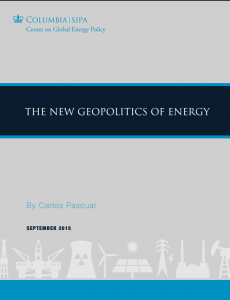Full Title: The New Geopolitics of Energy
Author(s): Carlos Pascual
Publisher(s): Columbia SIPA Center on Global Energy Policy
Publication Date: September 1, 2015
Full Text: Download Resource
Description (excerpt):
While America’s new oil and natural gas abundance may hold the allure of allowing it to adopt a more isolated position in global energy markets, this will ultimately not serve its national security interests. Energy markets are becoming more global, and the United States cannot isolate itself from price movements that have a direct impact on the US economy. From a political and environmental standpoint, the United States has an interest in seeing investment in sustainable energy solutions. A policy of isolationism would also forgo the drivers—open markets and entrepreneurship—that sparked the American energy revolution to begin with.
The United States, like other major energy producers in the past, has used its newly tapped energy resources to support its international objectives. However, interfering with markets can come with unintended consequences that can ultimately undermine the interests of the United States and its international partners. The “Rules of Six” outlined within this paper set up a framework for policymakers to evaluate interventions in a way that helps ensure they are successful.
US policymakers must have a better understanding of how changes in global energy markets impact the nation’s interests, including the current shifts in global energy demand, the diversification of oil supply sources and the increased competition in global gas markets, the incentives for power investment across nations and the implications for climate change, and the need to increase energy access globally and the repercussions for failing to meet that demand.
If nations see stopping climate change as a key foreign policy and national security concern, then the financial and technical factors driving these investment trends must become a priority at the intersection of energy markets and geopolitical interests. To succeed, the United States and other nations must integrate finance experts, energy developers, engineers, climate scientists, and foreign policy specialists into the debate. At the same time, tackling the challenge of universal access to energy will require leaning heavily on business models in addition to technical solutions.
